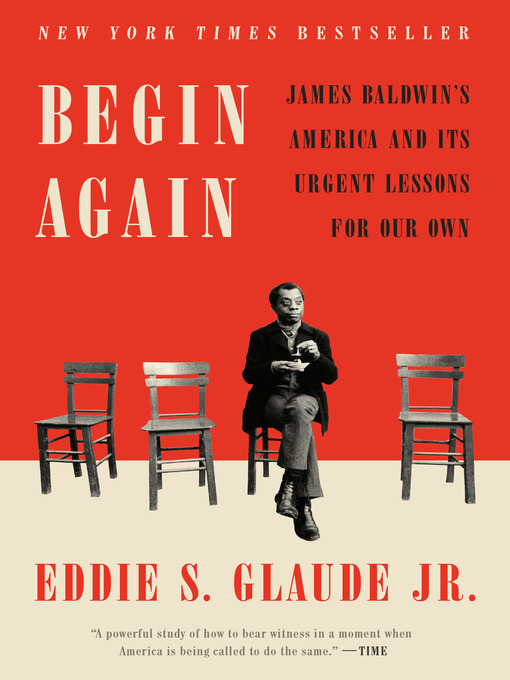
Begin Again
James Baldwin's America and Its Urgent Lessons for Our Own
- اطلاعات
- نقد و بررسی
- دیدگاه کاربران
نقد و بررسی

February 17, 2020
This erudite take frames the election of Donald Trump to replace America’s first black president as a “betrayal” analogous to the rise of Richard Nixon’s “so-called silent majority” following the collapse of the civil rights movement and looks to James Baldwin’s post-1968 writings for lessons in navigating the current political moment. Princeton University professor Glaude (Democracy in Black) explores how Baldwin’s focus shifted from “the gaze of white America” to the “well-being and future of black people” in his later work, including No Name in the Street (1972) and the documentary film I Heard It Through the Grapevine (1982), and contends that living in Istanbul gave Baldwin the privacy necessary to “reimagine hope” in the wake of Martin Luther King Jr.’s assassination. Glaude also details Baldwin’s complex relationship with the Black Power movement and his “prescient view” of the impact of mass incarceration on African-Americans. Applying these insights to the Black Lives Matter movement, debates over the removal of Confederate monuments, and modern-day identity politics, Glaude at times seems to be trying to fit three books into one. Nevertheless, he makes an effective and impassioned case for those dismayed by Trumpism to remain committed to building “a genuine democratic community where we all can flourish.” Progressives and fans of Baldwin’s work will savor this perceptive reappraisal.

Starred review from March 1, 2020
A penetrating study of how the words of James Baldwin (1924-1987) continue to have (often painful) relevance today. Glaude, a frequent guest on political talk shows and chair of the African American Studies department at Princeton, has long read, admired, and taught Baldwin's work. In this follow-up to his 2016 book, Democracy in Black: How Race Still Enslaves the American Soul, the author mines that work to illustrate our ongoing inability to confront what both Baldwin and Glaude call the lie at the center of our American self-conception and how the nation refuses "to turn its back on racism and to reach for its better angels." Glaude employs a blend of genres: some biography of Baldwin (the text ends at Baldwin's gravesite), literary analysis of key works, memoir (first-person appears throughout), and pieces of American history, especially those events that many of us don't want to think about. Repeatedly, the author examines "the ugliness of who we are"--and of the men we have elected president (Reagan and Trump do not come off well). In prose that is eloquent and impassioned--sometimes hopeful, sometimes not--the author presses his fingers on our bruises, the ones many of us would prefer to ignore. Among his many topics: Martin Luther King Jr. and how his murder both elevated his status and began to create the myth that conceals much of the truth about him; the civil rights movement and how many of its gains have been lost; the mass incarceration epidemic and what the author believes are the legally sanctioned murders of young black men. Much of the focus, of course, is on Baldwin: his literary rise, his years abroad (France, Turkey), and how, later in life, he continued to sell well but had lost the approval of many key literary critics. Both Baldwin and Glaude argue that we must begin again. Baldwin's genius glimmers throughout as Glaude effectively demonstrates how truth does not die with the one who spoke it.
COPYRIGHT(2020) Kirkus Reviews, ALL RIGHTS RESERVED.

April 1, 2020
The persisting problem of race lies at the core of malaise in the United States, argues Glaude (African American studies, Princeton Univ.; Democracy in Black). In this book spanning memoir, history, and cultural analysis, he asks the nation to confront the legacy of the civil rights movement of the 1960s. To clarify where the country has come from and failed to go, Glaude revisits what James Baldwin witnessed and remarked on in In the Fire Next Time (1963) and No Name in the Street (1972) works exposing dark realities of the nation's racial ferment. Glaude excavates the rubble and ruin of the nation's contradictions and failures, alongside a personal journey of self-discovery. Most importantly, Glaude writes about our collective responsibility to navigate disappointments, harness rage, and live with faith that good works can result in the triumph of "the better angels of our nature." VERDICT This is not an easy read for those wanting easy answers about race. Instead, it is a book about moral reckoning, owning up to failed choices, and making an effort to choose better ones. For all interested in uncovering how we got here, and how much further we have to go.--Thomas J. Davis, Arizona State Univ., Tempe
Copyright 2020 Library Journal, LLC Used with permission.




دیدگاه کاربران